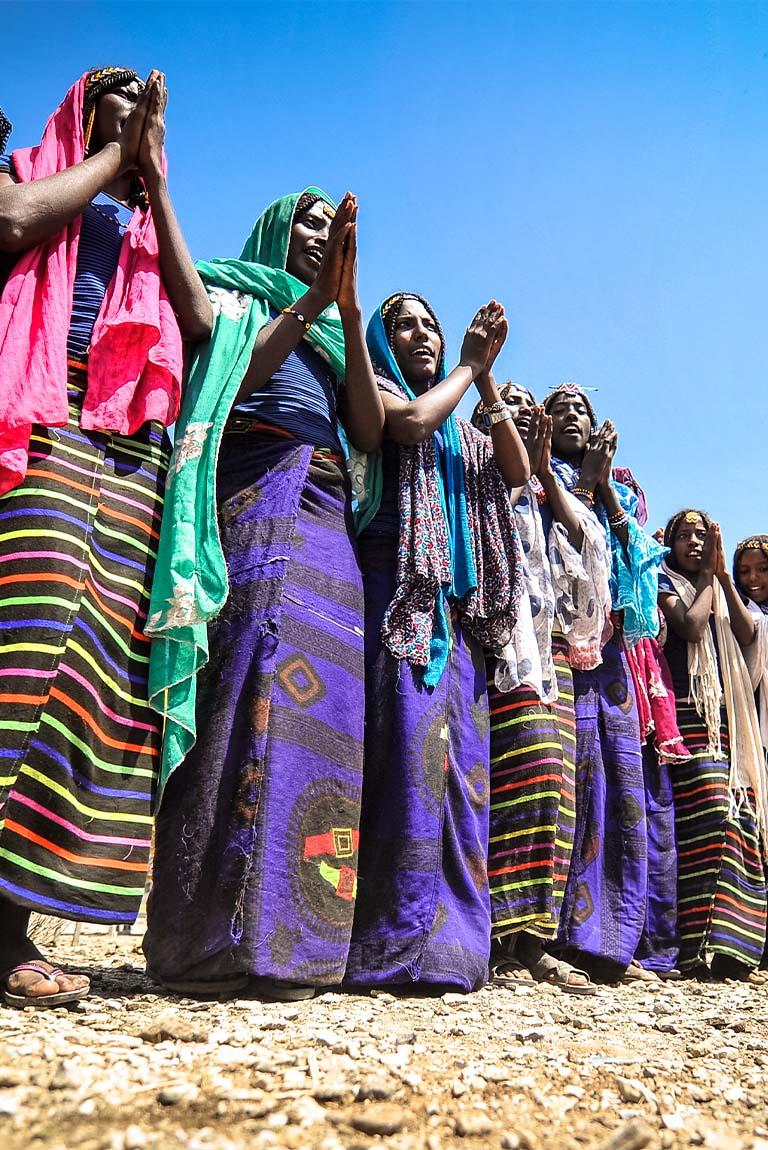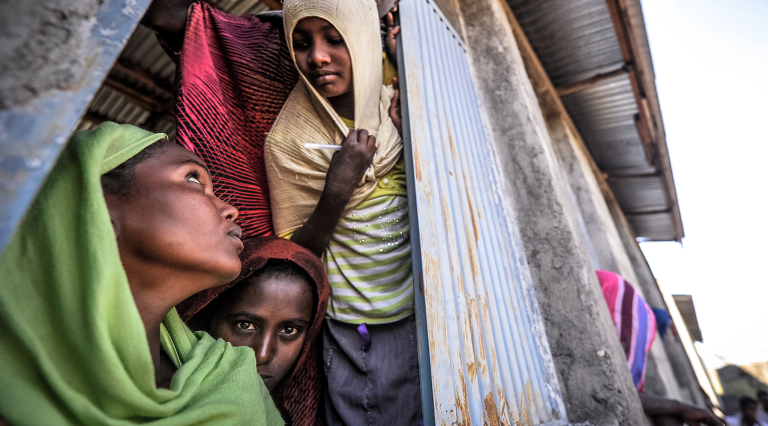A combination of conflict and the country’s healthcare situation means Ethiopia is in need of humanitarian assistance.
Support for primary healthcare in Afar Region, in the district of Dubti.

© Quentin Top
prevalence of HIV in adults.
rate of HIV infection in sex workers.
The prevalence of HIV in women (1.2% of 15-49-year-olds) is twice as high as in men (0.6% of 15-49-year-olds).
Médecins du Monde’s emergency response includes a range of humanitarian assistance programmes. Find out more below about our work and missions in Ethiopia.
The Federal Democratic Republic of Ethiopia is the second largest country in Africa. It is a land of both origin and transit for large numbers of migrants and refugees.
Despite rapid economic growth in recent years, Ethiopia remains a two-tier country.
A combination of conflict and the country’s healthcare situation means Ethiopia is in need of humanitarian assistance.
Fighting in the north of the country has been ongoing since November 2020, when the national defence forces invaded Tigray and took control of Mekele following the attack by the forces of the TPLF (Tigray People’s Liberation Front) on the Northern Command military headquarters.
Ethiopia is particularly exposed to food insecurity, with over 20 million people in need of direct food aid in 2021 in the regions of Amhara, Afar, Oromia et Somali.
The humanitarian situation in Ethiopia is the result of a vicious circle of conflict, drought, food insecurity, malnutrition, lack of access to water, forced displacements, floods, epidemics and limited pasture renewal.
For many years Afar and Somali have been the regions most affected by crises and natural disasters. Health indicators here are more concerning than in other regions of the country.
They include a mortality rate for children under the age of five that is much higher than the average for the country.
Health problems such as malnutrition, diarrhoea, waterborne and foodborne diseases and respiratory conditions are widespread in the region.
The Covid-19 epidemic reached Ethiopia in March 2020 and by the end of 2021 the country had recorded over 372,000 confirmed cases and more than 68,000 deaths. The epicentre of the epidemic was the capital Addis Ababa. Areas of informal housing were most affected, but there was a failure to tailor communication about the virus to the practices and specific situations of the people living in these areas (slum dwellers and migrants from rural areas).
HIV/AIDS disproportionately affects certain groups in Ethiopia, especially sex workers, of whom 23% were HIV positive in 2021, according to UNAIDS. They are among those most at risk of contracting sexually transmitted infections, being subjected to violence and being excluded from basic social services. However, there are no reliable official data on the numbers of sex workers in Ethiopia, nor on how many of them have experienced gender-based violence (GBV).

© Quentin Top
In response to the health issues in Ethiopia, the medical and humanitarian assistance we provide is focused on raising awareness in local communities and making medical care accessible for all.
THE 3 PILLARS OF OUR WORK IN ETHIOPIA
In 2021, Médecins du Monde France launched an emergency response project to improve and restore access to good quality primary healthcare and sexual and reproductive healthcare in Afar and Oromia Regions. The plan was to carry out epidemic prevention work (including for Covid-19) and to screen for and refer cases of malnutrition.
This project was funded by the European Union (DG ECHO) and delivered in partnership with Médecins du Monde Germany and international NGO COOPI. The project supported 5 health centres and used mobile clinics to reach the most isolated communities.
In 2021:
This project was designed to improve infection prevention measures at healthcare facilities and quarantine centres, increase training for healthcare staff and support communities in combating Covid-19, with a particular focus on those people identified as most vulnerable.
In addition, in Afar Region, protection measures were implemented for the most vulnerable, especially women, children and young people at risk of GBV.
The aim of the project is to reduce the risks and promote respect for the fundamental rights of sex workers along the route between Addis Ababa and Djibouti. It’s a busy transport corridor used by large numbers of truckers and many vulnerable people are engaged in sex work there.
The project provides access to sexual and reproductive health services (information, testing and treatment for sexually transmitted infections, HIV/AIDS testing, pre- and post-exposure prophylaxis and anti-retroviral treatment, access to family planning and services combating sexual violence). In addition, psychological support, legal services and training are also offered through the project.
In 2021:
Beneficiaries in 2021.
Budget in 2021.
Beneficiaries in 2021.
Budget in 2021.
Support for primary healthcare in Afar Region, in the district of Dubti.
Surgeon training programme opened in Addis Ababa and Aksum.
Primary healthcare intervention in Somali Region. Programme closed in 2011.
Programme of support for Eritrean refugees.
One-off response to a cholera outbreak in several districts in Afar Region.
Emergency cholera response and launch of sex worker programme along the route between Addis Ababa and Djibouti.
Intervention in Somali Region in partnership with local organisation (OWDA) and the regional authorities.
Start of harm reduction project for sex workers on the Addis Ababa – Djibouti corridor;
Start of the emergency primary healthcare intervention in the Oromo region.
Start of the emergency primary healthcare intervention in the Tigray border area of the Afar region.
84 avenue du Président Wilson
93210 Saint Denis
+331 44 92 15 15
Invalid email
Please fill in all required fields
